
Fury is a 1936 American crime film directed by Fritz Lang that tells the story of an innocent man who narrowly escapes being burned to death by a lynch mob and the revenge he then seeks. The film was released by Metro-Goldwyn-Mayer and stars Sylvia Sidney and Tracy, with a supporting cast featuring Walter Abel, Bruce Cabot, Edward Ellis and Walter Brennan. Loosely based on the events surrounding the Brooke Hart murder in San Jose, California, the film was adapted by Bartlett Cormack and Lang from the story Mob Rule by Norman Krasna. Fury was Lang's first American film.
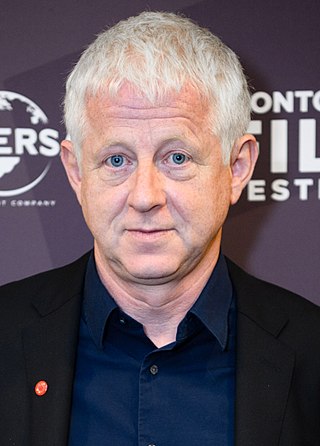
Richard Whalley Anthony Curtis is a British screenwriter, producer, director and author. One of Britain's most successful comedy screenwriters, he is known primarily for romantic comedy films, among them Four Weddings and a Funeral (1994), Notting Hill (1999), Bridget Jones's Diary (2001), Love Actually (2003), Bridget Jones: The Edge of Reason (2004), About Time (2013), and Yesterday (2019). He is also known for the drama War Horse (2011) and for having co-written the sitcoms Blackadder, Mr. Bean, and The Vicar of Dibley. His early career saw him write material for the BBC's Not the Nine O'Clock News and ITV's Spitting Image.
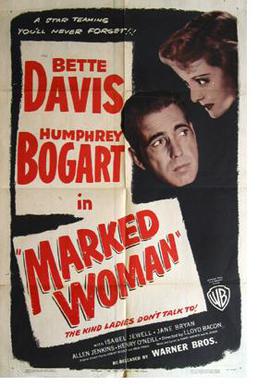
Marked Woman is a 1937 American dramatic crime film directed by Lloyd Bacon and starring Bette Davis and Humphrey Bogart, with featured performances by Lola Lane, Isabel Jewell, Rosalind Marquis, Mayo Methot, Jane Bryan, Eduardo Ciannelli and Allen Jenkins. Set in the underworld of Manhattan, Marked Woman tells the story of a woman who dares to stand up to one of the city's most powerful gangsters.
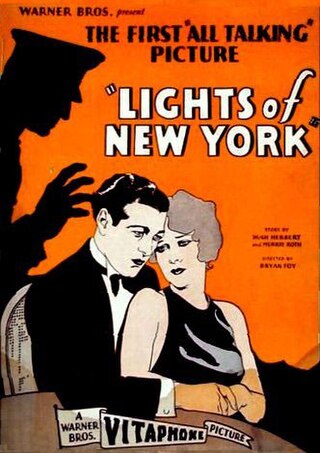
Lights of New York is a 1928 American crime drama film starring Helene Costello, Cullen Landis, Wheeler Oakman and Eugene Pallette, and directed by Bryan Foy. Filmed in the Vitaphone sound-on-disc sound system, it is the first all-talking full-length feature film, released by Warner Bros., who had introduced the first feature-length film with synchronized sound Don Juan, in 1926; and the first with spoken dialogue, The Jazz Singer, in 1927. The film, which cost $23,000 to produce, grossed over $1 million. The enthusiasm with which audiences greeted the talkies was so great that by the end of 1929, Hollywood was producing sound films exclusively.

They Won't Forget is a 1937 American drama film directed by Mervyn LeRoy and starring Claude Rains, Gloria Dickson, Edward Norris, and Lana Turner, in her feature debut. It was based on a novel by Ward Greene called Death in the Deep South, which was in turn a fictionalized account of a real-life case: the trial and subsequent lynching of Leo Frank after the murder of Mary Phagan in 1913.

Edward John David Redmayne is a British actor. He has received various accolades, including an Academy Award, a Tony Award, a BAFTA Award, and two Olivier Awards.
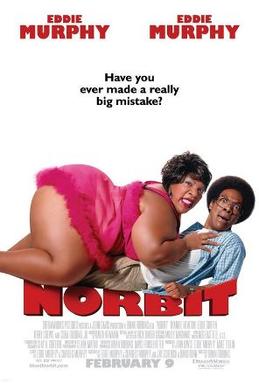
Norbit is a 2007 American comedy film, directed by Brian Robbins, and co-written by, co-produced by, and starring Eddie Murphy. The film co-stars Thandie Newton, Terry Crews, Cuba Gooding Jr., Eddie Griffin, Katt Williams, Marlon Wayans, and Charlie Murphy. It was released by DreamWorks and Paramount Pictures on February 9, 2007. Eddie Murphy portrays multiple roles including the eponymous Norbit and his abusive obese wife Rasputia. Norbit, unhappily married, is reunited with his childhood sweetheart Kate, but must contend with Rasputia and her brothers.

Sea Raiders is a 1941 Universal film serial starring the Dead End Kids and Little Tough Guys. This was the teen stars' second of three serials, between Junior G-Men (1940) and Junior G-Men of the Air (1942). Sea Raiders was the 52nd serial to be released by Universal. The plot concerns the heroes foiling Nazi attacks on American shipping.
Gang Busters is a 1942 Universal movie serial based on the radio series Gang Busters.

Now I'll Tell is a 1934 American pre-Code drama film directed by Edwin J. Burke starring Spencer Tracy, Helen Twelvetrees, and Alice Faye. It was produced by Fox Film shortly before the company's merger with Twentieth Century Pictures. It marked the final screen appearance of former silent star Alice Calhoun.

Rawhide is a 1938 American Western film starring Lou Gehrig and released by 20th Century-Fox. It was directed by Ray Taylor and produced by Sol Lesser from a screenplay by Jack Natteford and Daniel Jarrett. The cinematography was by Allen Q. Thompson. This is the only Hollywood movie in which baseball great Lou Gehrig made a screen appearance, playing himself as a vacationing ballplayer visiting his sister Peggy on a ranch in the fictional town of Rawhide, Montana. The film remains available on DVD and VHS formats.

Kid Glove Killer is a 1942 American crime film, starring Van Heflin as a forensic scientist investigating the murder of a mayor. The B film, the feature-length directorial debut of Fred Zinnemann, was an expanded version of the 1938 Crime Does Not Pay short subject "They're Always Caught".
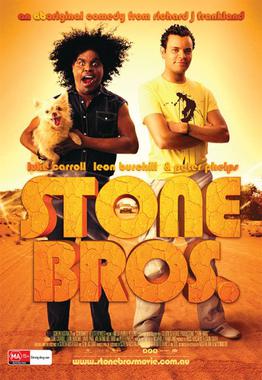
Stone Bros. is a 2009 Aboriginal Australian stoner comedy film directed by Richard Frankland. It was theatrically released in Australia on 24 September 2009.
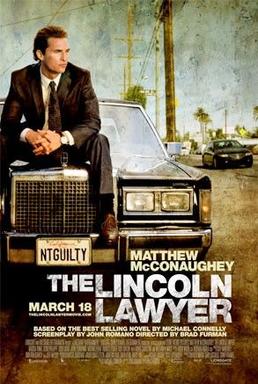
The Lincoln Lawyer is a 2011 American legal thriller film directed by Brad Furman and written by John Romano, based on the 2005 novel of the same title by Michael Connelly. It stars Matthew McConaughey as the titular lawyer, Mickey Haller. Ryan Phillippe, Marisa Tomei, Josh Lucas, John Leguizamo, William H. Macy, and Bryan Cranston also star.
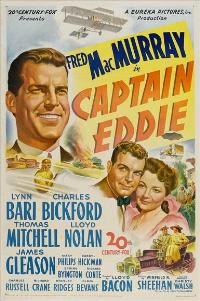
Captain Eddie is a 1945 American drama film directed by Lloyd Bacon, based on Seven Were Saved by "Eddie" Rickenbacker and Lt. James Whittaker's We Thought We Heard the Angels Sing. The film stars Fred MacMurray, Lynn Bari and Charles Bickford. Captain Eddie is a "biopic" of Rickenbacker, from his experiences as a flying ace during World War I to his later involvement as a pioneering figure in civil aviation, and his iconic status as a business leader who was often at odds with labour unions and the government.
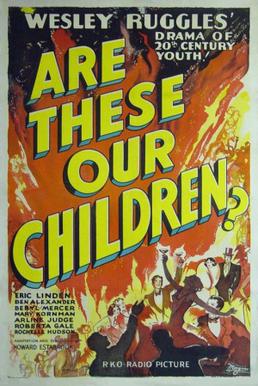
Are These Our Children? is a 1931 American pre-Code drama film directed by Wesley Ruggles and written by Howard Estabrook. The film stars Eric Linden, Ben Alexander, Beryl Mercer, Mary Kornman, Arline Judge, and Rochelle Hudson. The film was released on November 14, 1931 by RKO Pictures.
The Marshal of Mesa City is a 1939 American Western film directed by David Howard from a screenplay by Jack Lait Jr..
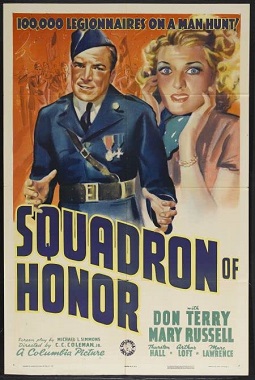
Squadron of Honor is a 1938 American action film directed by Charles C. Coleman and starring Don Terry, Mary Russell, and Thurston Hall. It was produced as a second feature by Columbia Pictures. The film's sets were designed by the art director Stephen Goosson.
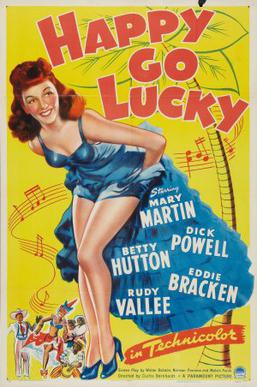
Happy Go Lucky is a 1943 American comedy film directed by Curtis Bernhardt and written by Walter DeLeon, Melvin Frank, John Jacoby and Norman Panama. The film stars Mary Martin, Dick Powell, Betty Hutton, Eddie Bracken, Rudy Vallée, Mabel Paige and Eric Blore. The film was released on January 4, 1943, by Paramount Pictures. It might be best remembered now for Betty Hutton's energetic performance of the song "Murder, He Says," written by Frank Loesser and Jimmy McHugh.
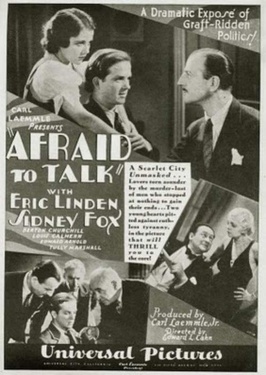
Afraid to Talk is a 1932 American pre-Code drama film directed by Edward L. Cahn and written by Tom Reed. The film stars Eric Linden, Sidney Fox, Tully Marshall, Louis Calhern, George Meeker and Robert Warwick. The film was released on December 1, 1932, by Universal Pictures.


















